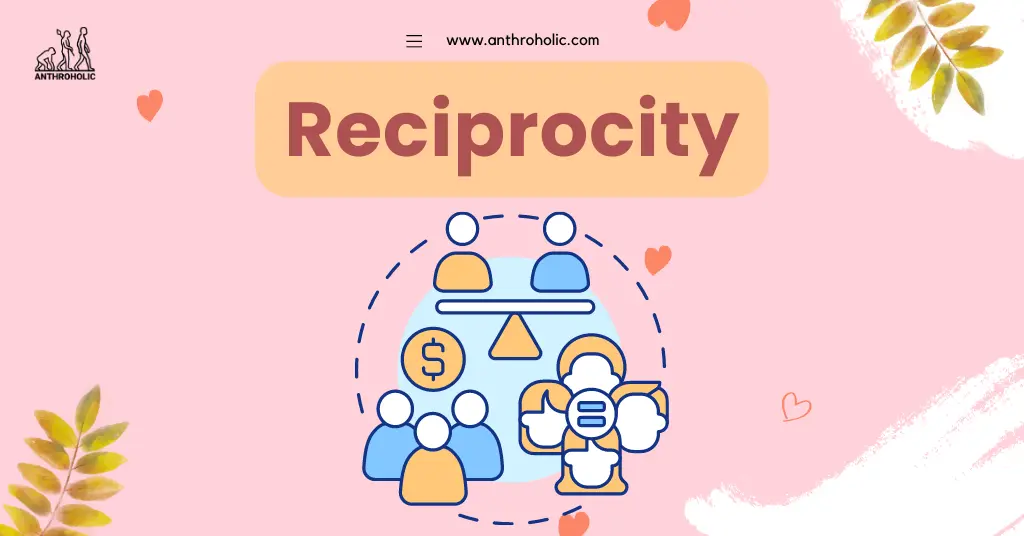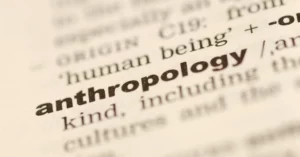AI Answer Evaluation Platform Live Now. Try Free Answer Evaluation Now
Reciprocity
In the domain of economic anthropology, reciprocity is an intricate and essential element in economic exchanges that transpires across diverse cultures. Often defined as a mutual give-and-take process, reciprocity occurs when goods or services are exchanged amongst individuals or groups [1].

Types of Reciprocity
Anthropologist Marshall Sahlins conceptualized three types of reciprocity: generalized, balanced, and negative. This schema offers an essential insight into the nuances of different reciprocal exchanges.
Generalized Reciprocity
Generalized reciprocity refers to the giving of goods or services without expecting an immediate return. It’s characterized by:
- Close relationships, often familial or intimate
- Altruism and charity
- Long-term balance rather than immediate exchange
Balanced Reciprocity
Balanced reciprocity implies an immediate return of goods or services of equivalent value. Key features include:
- Shorter-term relationships, often among acquaintances
- A balance of give-and-take
- Mutual advantage
Negative Reciprocity
Negative reciprocity happens when parties aim to profit from the exchange at the expense of others. This encompasses:
- Distant or adversarial relationships
- Scams, theft, or deceptive bargaining
- Unfair advantage
The Role of Reciprocity in Economic Exchange
Economic exchanges are not solely about goods and services; they also involve social relationships and obligations. Let’s delve deeper into the sociocultural implications of reciprocal exchange.
- Social Bonding: Economic exchanges have the potential to establish and enhance social relationships [2]. By participating in reciprocity, individuals or groups can foster trust, which in turn strengthens societal bonds.
- Redistribution Mechanisms: In many societies, reciprocity serves as an inherent redistribution mechanism, helping in maintaining societal equilibrium and cohesion [3].
- Managing Resources: Reciprocal exchange can also be an effective method of managing resources. By sharing and redistributing, communities can ensure survival and sustainability [4].
Reciprocity in Various Societies
| Society | Reciprocity Type | Example |
|---|---|---|
| Maori, New Zealand | Generalized | “Hau” concept where giving is followed by counter-gift [5] |
| Trobriand Islanders, Papua New Guinea | Balanced | Kula Ring, a system of ceremonial exchange [6] |
| Western societies | Negative | Deceptive business practices [7] |
Challenges in Reciprocity
While reciprocity aids in economic exchange, it isn’t devoid of challenges:
- Unequal exchange leading to power imbalances
- Potential for manipulation and exploitation
- Cultural misunderstandings in cross-cultural exchanges
Future of Reciprocity in Economic Exchange
As societies continue to evolve, so does the nature of reciprocity. In the age of the internet and globalization, new forms of reciprocity are emerging like online gift economies, peer-to-peer sharing, and collaborative consumption [8].
Reciprocity in the Digital Age
In the digital era, the principles of reciprocity have taken a new turn. For instance, in the open-source community, people contribute their skills and time to develop software while expecting others to do the same. Similarly, in peer-to-peer file-sharing networks, individuals share files in exchange for receiving files from others [9].
- Crowd-Sourcing and Crowdfunding: Crowd-sourcing and crowdfunding platforms are also great examples of digital reciprocity. These online communities rely on the willingness of users to give and receive support in achieving common goals [10].
- Social Media and Content Creation: Reciprocity is also visible in social media and content creation platforms. Content creators often give their work freely, and in return, they receive likes, shares, and comments, strengthening their online presence [11].
Reciprocity and Economic Theory
Traditional economic theories have often overlooked reciprocity, focusing instead on concepts like supply, demand, and self-interest. However, behavioral economics brings reciprocity to the forefront, acknowledging that humans are social beings whose economic decisions are often influenced by their relationships with others [12].
In conclusion, reciprocity is not merely an economic transaction, it is a social and cultural process. Whether it’s a small village or a large corporation, reciprocal exchange contributes to the building and nurturing of relationships, shaping societies and economies.
References
[1] Mauss, M. (1954). The Gift: Forms and Functions of Exchange in Archaic Societies.
[2] Polanyi, K. (1957). The economy as instituted process.
[3] Sahlins, M. (1972). Stone Age Economics.
[4] Scott, J. C. (1976). The Moral Economy of the Peasant: Rebellion and Subsistence in Southeast Asia.
[5] Weiner, A. B. (1992). Inalienable possessions: the paradox of keeping-while-giving.
[6] Malinowski, B. (1922). Argonauts of the Western Pacific.
[7] Graeber, D. (2011). Debt: The First 5000 Years.
[8] Belk, R. (2010). Sharing. Journal of Consumer Research.
[9] Raymond, E. (2001). The Cathedral and the Bazaar: Musings on Linux and Open Source by an Accidental Revolutionary.
[10] Gerber, E., Hui, J. (2013). Crowdfunding: Motivations and Deterrents for Participation. ACM Transactions on Computer-Human Interaction.
[11] Jenkins, H. (2006). Convergence Culture: Where Old and New Media Collide.
[12] Fehr, E., Schmidt, K. M. (1999). A theory of fairness, competition, and cooperation. The Quarterly Journal of Economics.




